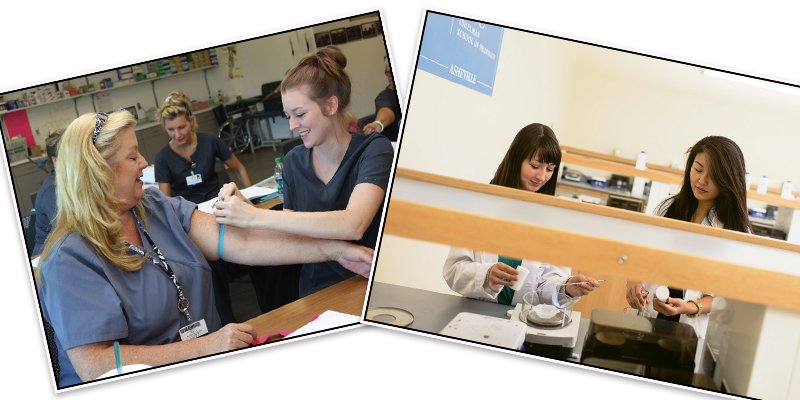Experiential Education
Experiential Education: Medicine
Nursing Training to Meet the Need - Blue Ridge Community College
To say there’s a need for qualified health-care providers in Western North Carolina is an understatement. At Blue Ridge Community College’s brand new Health Sciences Center on the campus of Pardee Hospital in Hendersonville, director Deanna Krause believes that using hands-on techniques to prepare nurse aides to work in hospitals and clinics is essential. Within the 100,000-square-foot facility are state-of-the-art classrooms that simulate a health-care working environment. “We need to teach our students to think independently, and to provide thorough care,” Krause says. In addition to helping them master their skills, she says, experiential learning boosts students’ confidence and gives them a better idea of what their future jobs will entail.
Providing Pharmaceutical Services to All - UNC Chapel Hill in Asheville
Roughly one third of the graduate curriculum at the UNC Eschelman School of Pharmacy is experiential. By working with physicians and other care providers in a clinical environment, students are able to apply their experience from the clinic to the classroom. “Our program stresses critical thinking and problem solving. We want our graduates to be able to think deeply about solving future medical problems and issues,” says Charlene Williams, an assistant professor and the school’s regional director of experiential education. “Our students get to observe and participate in innovative and progressive pharmacy practice.” Among the challenges of medical practitioners, including pharmacists, is figuring out how to provide care to rural residents. The degree program is the first to offer a Rural Pharmacy Health Certificate that provides students with hands-on practice managing patients in mountain communities where access to medical care may be limited.
Learning by Giving Physical Therapy - Western Carolina University
The student-operated Mountain Area Pro Bono Physical Therapy Clinic at WCU provides care at no cost to patients without insurance coverage. Students develop a three-tiered approach to monitor, treat, and assess patients. Coordinator Zach Huey says that working in the clinic gives budding therapists a crucial opportunity to put knowledge into practice. Not only do students get to hone their skills, they’re also engaging with the community and helping fill a necessary gap in medical care. Currently open two Wednesdays per month, the clinic is planning to expand operations in 2018.
